Nocturne continues to find its footing
Summary
Castlevania: Nocturne Season 2 refines its storytelling with stunning animation, intense battles, and deeper character arcs. Balancing revolution, revenge, and redemption, it delivers an emotionally charged, visually striking continuation of the Belmont saga in Netflix’s gothic anime universe.
Overall
-
Plot
-
Narrative
-
Acting
-
Characterization
-
Action
-
Pacing
For a long time, Netflix’s Castlevania series stood out as one of the most faithful and polished adaptations of a video game property. It managed to capture the essence of its source material while elevating the narrative with sophisticated animation, strong voice acting, and striking visuals. When the spinoff, Castlevania: Nocturne, arrived as a new chapter set during the tumultuous days of the French Revolution, many fans were both excited and cautiously optimistic. The first season of Nocturne offered high-octane action and detailed animation, but it sometimes struggled to find the perfect balance in pacing and character focus. Our Castlevania: Nocturne Season 2 review agrees that it gives the show a more assured rhythm, delivering greater emotional weight and coherence in its storytelling.
At the start of this second season, we find ourselves right where the first one left off. Young vampire hunter Richter Belmont (voiced by Edward Bluemel), along with Maria Renard (Pixie Davies) and Annette (Thuso Mbedu), are all still shaken by their confrontation with Erzsebet Báthory, the self-proclaimed Vampire Messiah who has ascended to near-godhood. Erzsebet, who has declared herself a Vampire Messiah, managed to ascend to a near-divine level of power, making their earlier triumph feel hollow. Even though the heroes succeeded in pushing her back for a moment, the threat of her ultimate plan—to plunge the entire world into eternal darkness—still looms over them. Their desperation deepens when they realize that Erzsebet, far from being defeated, is only becoming more formidable.
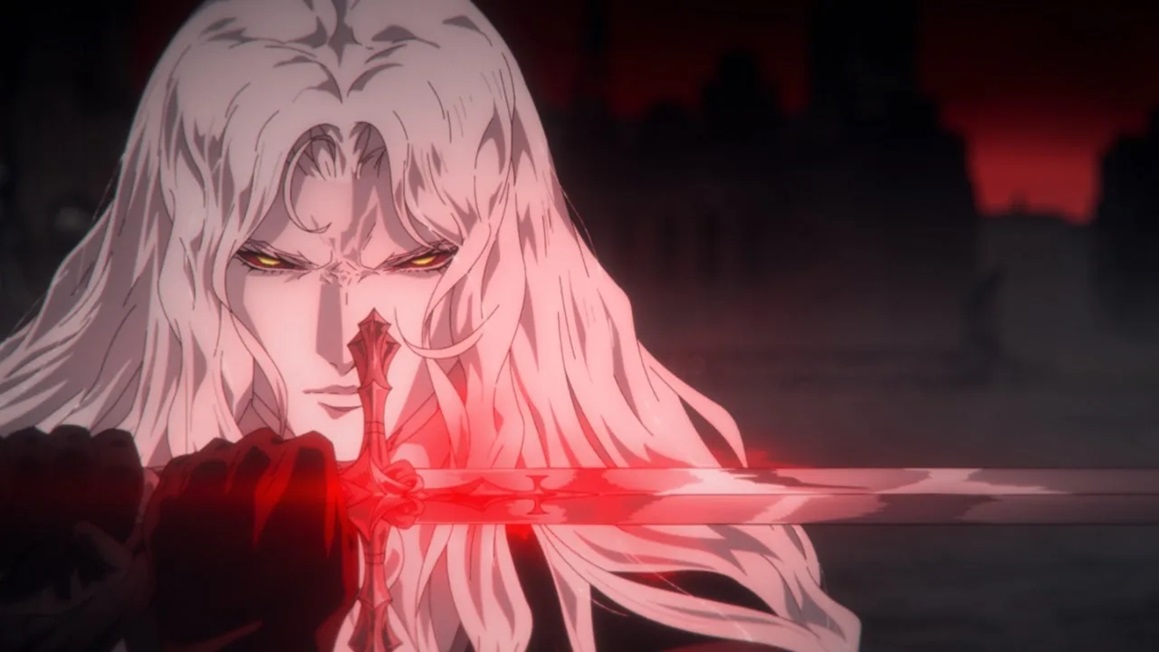
A sudden bit of hope arrives in the form of Adrian “Alucard” Șepeș (Alucard) (Sydney James Harcourt). He appears unexpectedly, offering his knowledge, experience, and a unique perspective on battling ancient evils. Yet his involvement also introduces new layers of conflict and responsibility. The group ultimately splits into two teams, each facing different challenges. One contingent travels to Paris in a bold attempt to confront Erzsebet on her home turf, hoping to disrupt her dark ambitions. The other group remains in Machecoul, a setting that holds painful memories and unresolved betrayals. This division of the main cast highlights each character’s personal struggles—some are motivated by vengeance, while others grapple with questions of loyalty and duty in a world on the brink of complete chaos.
From the outset, the artistic style of this season leaves a deep impression. The animation remains as vibrant and fluid as ever, but there’s a notable refinement in the flow of the action. Battle sequences feel tightly choreographed, carrying a sense of urgency and authenticity that draws viewers into every clash of swords and burst of magical energy. Richter’s abilities, particularly his mastery over elemental magic, are on full display with greater finesse. Whether he’s summoning fire, lightning, or ice, his powers come across as both dangerous and awe-inspiring. Gone is the sense that he’s still a novice struggling with his family’s legacy. He now carries himself like a seasoned warrior whose reputation as a Belmont is no mere accident.
In one standout fight, Richter unleashes a combination of lightning strikes and swordsmanship against a horde of undead beasts, each movement captured with a flurry of electric arcs and sweeping visuals. Moments like these illustrate how the animators took feedback from the first season and refined every frame to create battles that feel both intimate and grand. The concluding confrontations set in Paris, involving multiple layers of strategy and shifting alliances, showcase some of the best visual storytelling of the entire franchise. These sequences emphasize not just power and spectacle but also the emotional states of the characters, who each have a specific reason for risking their lives in this war against darkness.
Beyond the action, the aesthetic leans into color palettes that match the show’s themes. Sunlit scenes outside the grim cityscape of Paris hint at the hope the protagonists cling to, even as the Revolution deteriorates into violence and disorder. The bright blues and greens of rural fields contrast sharply with the shadows that gather in alleyways, where tension runs high, and trust is scarce. By immersing us in an environment that oscillates between light and dark, the visuals underline the show’s core idea: that hope and despair often coexist, especially in times of upheaval.
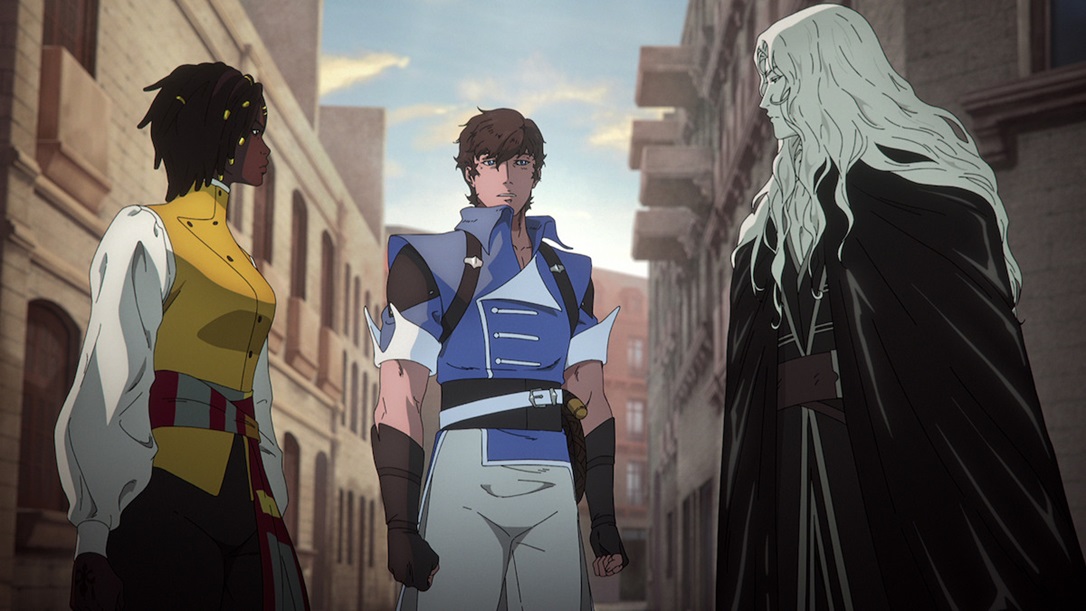
Still, the season’s real triumph lies in how it treats its characters. Each member of the cast gains a deeper backstory and personal arc. Richter’s development is no longer limited to his desire to be worthy of the Belmont name. He’s forced to confront his own weaknesses, learning that he cannot carry this mission alone. His willingness to admit vulnerability allows him to form stronger bonds with the people around him. Meanwhile, Annette, whose abilities revolve around controlling rock and metal, has to reconcile her fight for justice with the deeper, more personal feelings she develops for Richter. Their growing relationship is never flashy or melodramatic. Instead, it’s presented in subtle, thoughtful scenes that lend emotional weight to a story otherwise filled with supernatural conflict.
Maria Renard takes on a central role in Machecoul, where she faces devastating family issues and a fracturing sense of identity. Early in the season, she learns of her mother’s transformation into a vampire. This discovery, combined with the realization that her father has betrayed them all, pushes Maria to her emotional limit. Pixie Davies conveys these turbulent feelings with a rawness that stands out even among the strong performances in the cast. One key moment sees Maria confronting her father, known as the Abbot, (Richard Dormer), in a charged scene of accusations and confessions.
The emotional stakes are enormous—Maria isn’t just fighting for her life, but for her sense of belonging and purpose. This confrontation also mirrors the broader political climate, where betrayals and backstabbing run rampant, and where the personal and political battles constantly intertwine.
Alucard’s entrance energizes the narrative. His reputation precedes him: he is the son of Dracula, a figure many consider the most legendary vampire in existence. The weight of his heritage becomes a point of reflection for both him and everyone around him. Sydney James Harcourt captures Alucard’s quiet resolve, mixed with a lingering sense of melancholy. He understands the monstrous side of vampirism more intimately than anyone, and he recognizes the tenuous boundaries between humanity and darkness. His presence carries a certain gravitas that both impresses and intimidates Richter, who looks up to Alucard’s mythic status but also wonders whether his own strength will ever compare. In scenes where they fight side by side, there’s a sense of a baton being passed from an older, battle-hardened generation of heroes to a younger one still discovering its full potential.
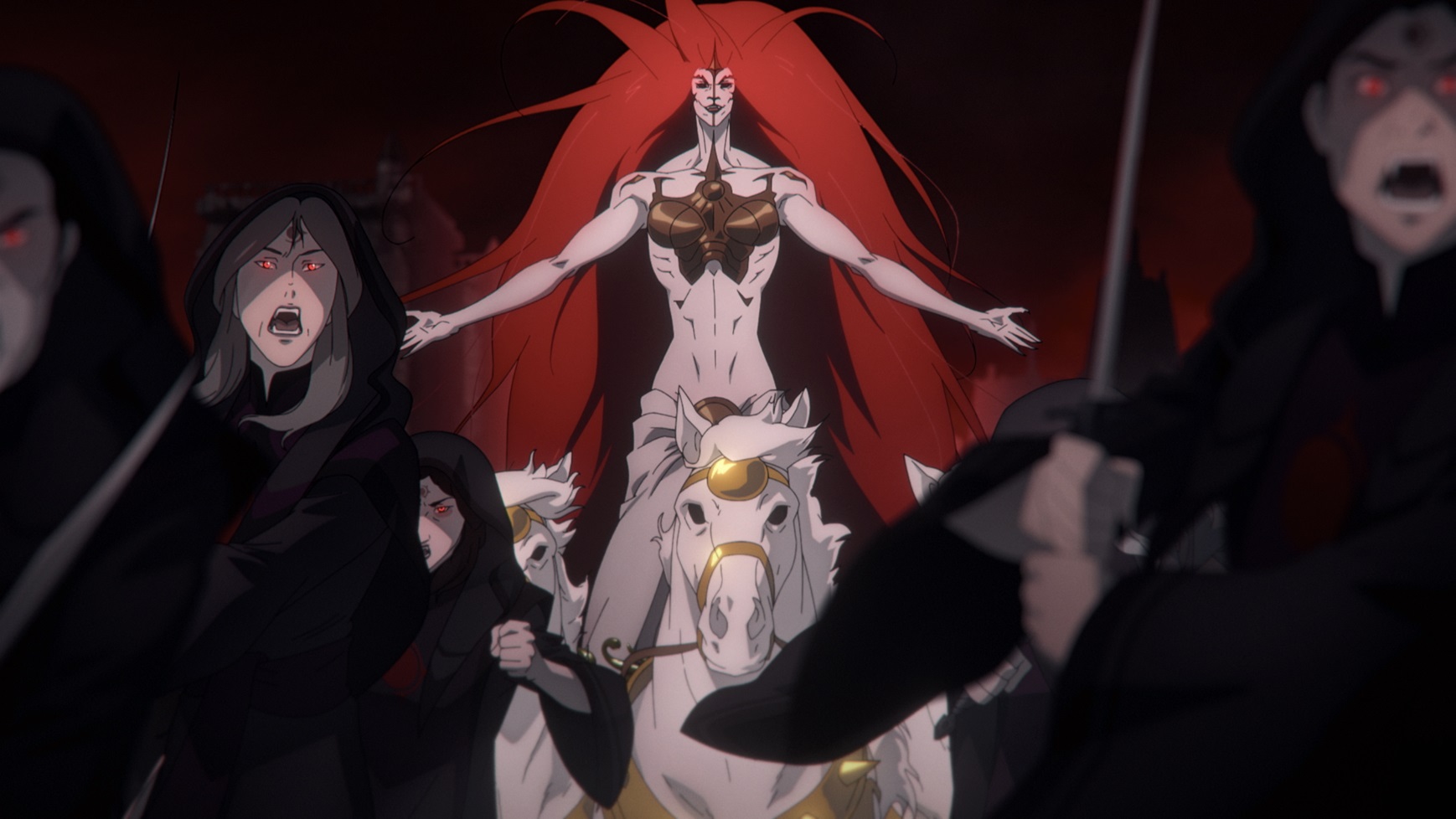
The antagonists of this season vary in their effectiveness. Erzsebet Báthory, with her ostentatious blood rituals and declared status as a Vampire Messiah, delivers memorable imagery. Her presence is enhanced by chilling moments of cruelty that confirm she poses a dire threat. Yet she lacks the psychological and emotional layers that made Dracula such a compelling antagonist in the original Castlevania series. Although her powers and designs are impressive, her motivations appear straightforward. She wants dominion, darkness, and worship. In comparison, the figures surrounding her sometimes feel more intriguing. Drolta Tzuentes, Erzsebet’s main accomplice, gradually reveals a past that involves serving Sekhmet as a priestess before betraying her new mistress. This twist adds dimension to her storyline, creating a sense of divided loyalties that underscores the complexity of evil in a chaotic world. Watching Drolta navigate loyalty and ambition—eventually deciding to take matters into her own hands—introduces conflict that helps compensate for Erzsebet’s flatness.
Count Olrox (Zahn McClarnon) continues to capture the imagination as well. As an Aztec vampire with a history that clearly shapes his approach to power and alliances, he remains an enigma. Unfortunately, this season gives him limited screen time. Hints of his own agenda suggest he may become a more pivotal player in future seasons, but for now, his potential goes largely untapped. Whenever he does appear, there’s a tension in the air—a feeling that he’s biding his time, waiting for the perfect moment to strike, or perhaps forming an alliance that benefits him more than it benefits anyone else.
One of the most haunting and touching subplots we have reviewed in Castlevania: Nocturne Season 2 involves Edouard (also voiced by Sydney James Harcourt), Annette’s friend who was transformed into a Night Creature during the previous season. He has now become a leader among beings of his kind, rallying them against the vampires who view them merely as expendable foot soldiers. Edouard’s struggle to maintain his humanity while succumbing to monstrous impulses creates a tragic layer to the show. On multiple occasions, viewers hear him sing—a heartbreaking echo of the person he used to be. Those musical segments are particularly effective because they capture the profound sadness of a soul caught between two worlds. They also illustrate how cruelty and oppression warp even the kindest spirits when given no escape. Edouard’s arc underscores the high stakes of this conflict, reminding us that victory is never as simple as killing the enemy. There are always casualties in spirit, psyche, and identity.
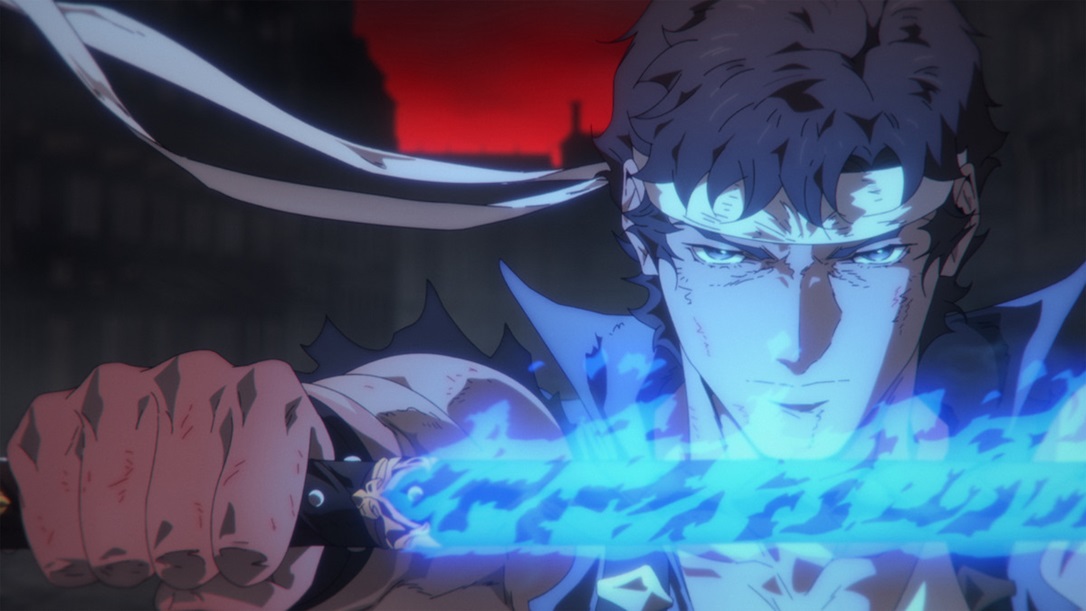
The musical score and sound design play equally essential roles in immersing the audience in Nocturne’s gothic world. Eerie choral arrangements and sweeping orchestral pieces blend seamlessly with reimagined versions of fan-favorite themes like “Bloody Tears.” At pivotal moments—such as the unveiling of a particularly gruesome vampire ritual or the desperate last stand against a flood of demonic creatures—the music intensifies the drama. The clang of swords, the crackle of magic, and the beastly roars are meticulously mixed to enhance each scene’s tension. When elemental magic collides with monstrous forms, the effect is explosive and enveloping. This combination of evocative musical compositions and crisp sound effects bolsters the show’s cinematic quality, making each episode feel like a self-contained epic.
Yet our review finds Castlevania: Nocturne Season 2 to be not without shortcomings. The storyline that unfolds in Paris, while undeniably exciting, can seem rushed. Certain plot points pass by quickly, without the breathing room that might have made them more impactful. Alucard and Richter, for example, share compelling conversations about legacy and responsibility, but those exchanges often feel too brief. A few more scenes of the two men delving deeper into each other’s motivations, hopes, and fears could have elevated their dynamic further. Similarly, Annette’s venture away from the central team has breathtaking visuals—showing off new landscapes and magical confrontations—but sometimes feels disconnected from the larger narrative. Although her arc does circle back in a decisive way, there’s a sense that the season juggles multiple threads without granting each enough time to fully resonate.
Another area with unrealized potential is the show’s engagement with the French Revolution itself. The Revolution provides the historical backdrop, ensuring there is ongoing turmoil that mirrors the bloodshed unleashed by the vampire threat. However, the series rarely takes advantage of the deeper social and political upheaval, beyond using it as a dramatic stage. Moments that explore how a population already weary of social injustice might respond to or intersect with supernatural exploitation are fewer than one might expect. Additionally, Annette’s connection to Saint-Domingue (modern-day Haiti) alludes to rich possibilities for exploring colonialism, slavery, and rebellion, but those elements stay mostly on the sidelines. If Nocturne had embraced the full weight of its historical setting, it could have drawn more powerful parallels between human revolution and the battle against vampiric oppression.
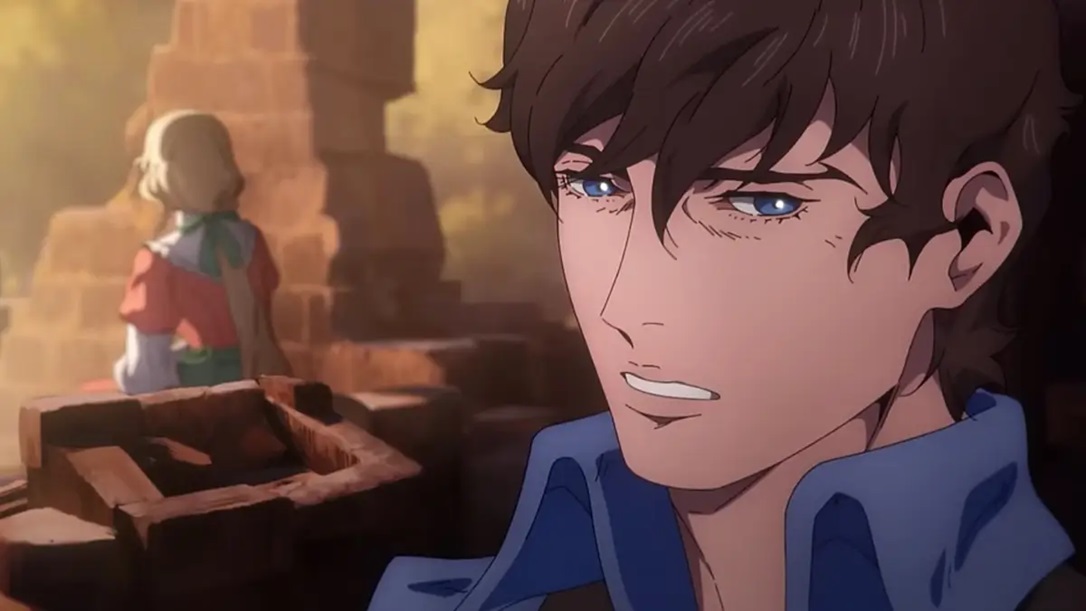
Despite these criticisms, Castlevania: Nocturne Season 2 stands out as a substantial improvement over its predecessor. It demonstrates that the creative team has learned from earlier missteps and is committed to exploring character depth, emotional stakes, and thematic resonance. Where Season 1 sometimes felt like a flurry of action sequences waiting to coalesce, this new batch of episodes forms a more cohesive tale. The arcs are clearer, and the characters’ motivations shine more brightly. Whether it’s Richter wrestling with his Belmont heritage, Maria confronting her family’s betrayal, or Annette carving out her own path while grappling with her powers, each journey lands with more weight.
By the time the season reaches its closing moments, the tone signals that a grander conflict is still unfolding. Erzsebet’s defeat—or survival—remains up in the air, and new alliances seem both promising and fraught with potential for betrayal. Alucard’s role remains an open question: he has one foot in the world of humans, one in the realm of monsters, and he rarely fits neatly into either. Meanwhile, Count Olrox’s motivations remain under wraps, leaving viewers to wonder when he might reveal the depth of his plan. These lingering uncertainties promise a future that could exceed the scale and intensity we’ve seen so far.
The emotional journeys of the main trio, reinforced by Alucard’s somber wisdom and Edouard’s tragic fight against his fate, give the storyline a beating heart. This emphasis on character, not just spectacle, is what truly differentiates Nocturne. The show no longer leans solely on epic vampire battles or stylized gore to maintain the audience’s attention. It also invests in the emotional realities of individuals forced into a war that seems endless, each of them carrying the scars of past losses. The horror of this universe isn’t just in encountering fanged creatures lurking in crumbling Gothic towers. It’s also the terror of knowing that one’s own mistakes or moments of weakness can be exploited by beings that thrive on suffering.
That sense of haunting vulnerability is mirrored in the philosophical undercurrents about power. Maria’s father, the Abbot, exemplifies how personal ambition and desperation can turn faith into fanaticism. Whether aligned with vampires or not, people who seek power at the expense of others risk their own humanity. This moral ambiguity is also present in characters like Drolta Tzuentes and Count Olrox, who are not purely evil but are molded by harsh realities and ancient vendettas. Even Richter wrestles with the cost of unleashing his magical abilities, mindful that pushing his powers too far might mirror the brutality he’s fighting against.
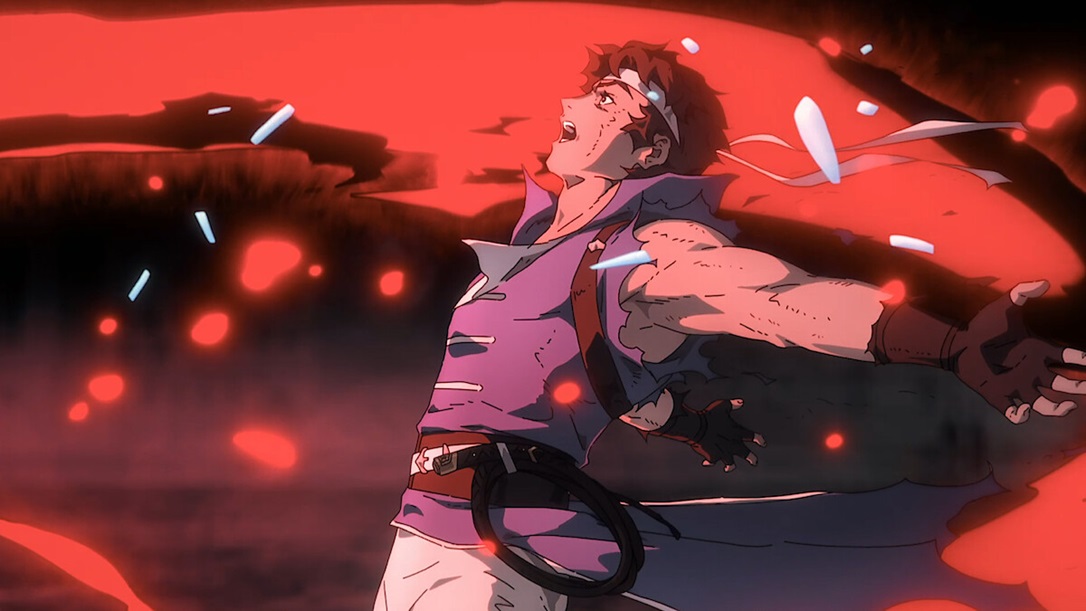
Against this backdrop of moral gray areas, the Revolution becomes more than a piece of historical setting. It transforms into a symbolic parallel: the people of France rise up against aristocratic exploitation, much like the heroes struggle against vampire lords who seek to drain humanity for their own ends. Though the series only briefly delves into this parallel, the implication is clear—oppression takes many forms, and monsters can be both literal and metaphorical. This synergy between history and fantasy could still be enriched further, but the foundation laid here is substantial enough to spark reflection on how the lines between good and evil blur during times of revolution.
Nocturne’s improved sense of pacing is another positive step. Season 1 often rushed from one fight to the next, leaving little time for introspection. Now, the quieter interludes stand out as some of the most compelling scenes. In one sequence, Annette lingers in a chapel that has become a makeshift refuge for people displaced by the conflict. She helps tend to wounds, both physical and emotional, and momentarily reconnects with the ideals of freedom that brought her into this battle in the first place. Moments like these provide necessary space for the narrative to breathe, allowing the characters’ motivations and values to become clearer.
Our Castlevania: Nocturne Season 2 review concludes that while the season doesn’t deliver a fully resolved conclusion—opting instead for a strong setup for future installments—it does provide a satisfying midpoint in the overall arc. Characters evolve significantly from where they began. Richter grows beyond the legacy-driven hero into someone who leads with empathy. Maria sheds much of her naïveté, emerging more determined, though perhaps also more burdened by the knowledge of her family’s deceit. Annette steps further into her own agency, balancing a thirst for retribution with her instinct for compassion. Even Alucard, who has a more supporting role, shows signs of renewed purpose after years of wandering aimlessly in the aftermath of his father’s downfall.
Each step forward for these characters paves the way for an even bigger payoff in the future. The seeds planted in these episodes—from potential alliances with conflicted Night Creatures to Olrox’s plans—signal that the universe is expanding in fascinating directions. If the series continues to blend its kinetic action sequences with emotional arcs and well-chosen historical elements, it could retain its reputation as one of the finest video game adaptations to date. It’s already done much of the heavy lifting by establishing a world rich in atmosphere, conflict, and personality.
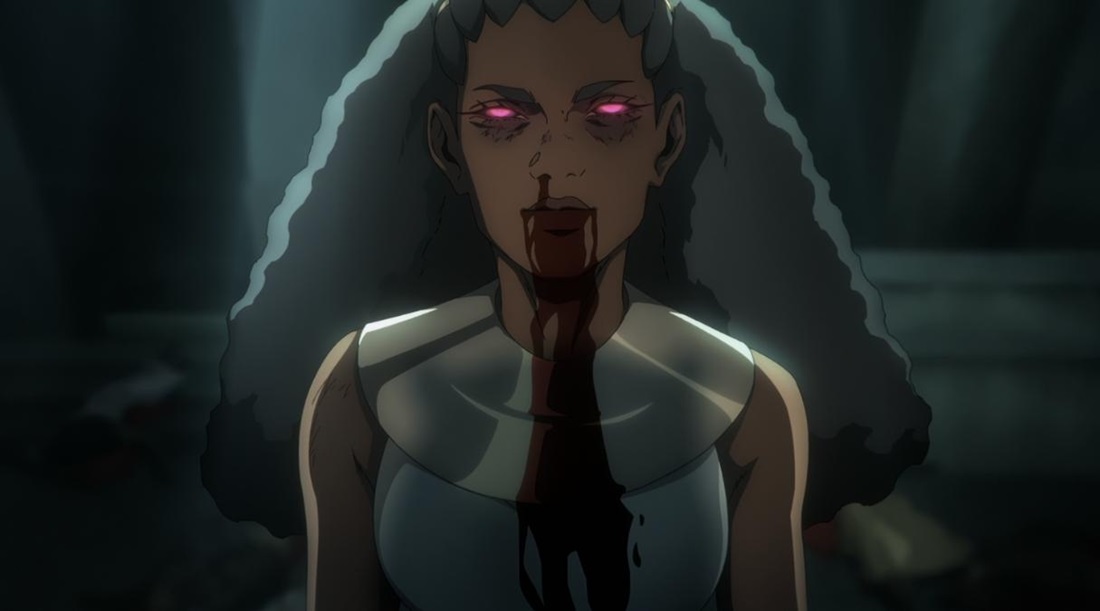
As Castlevania: Nocturne Season 2 comes to a close, our review finds us left with a taste of both victory and dread. Erzsebet may have been temporarily thwarted, but evil rarely stays buried for long. The French Revolution, meanwhile, rages on, threatening to create power vacuums that vampires and opportunists can exploit. Heroes like Richter, Maria, Annette, and Alucard have proven their resilience, yet they carry new emotional wounds and responsibilities that could challenge them as much as any immortal foe. The choice to end on a note that merges hope with foreboding reflects the essence of Castlevania: even when the night seems endless, there is always a small, flickering light that refuses to be quenched.
Ultimately, our Castlevania: Nocturne Season 2 review agrees it that the season represents an evolution in the Belmont saga, one that embraces the show’s dark roots while branching into territories that are both personal and political. It’s a season that takes bold swings in animation, character development, and theme. The narrative is still not perfect—some plot lines could use more depth, and a few villains feel under-explored—but it offers a richer, more resonant experience than its predecessor. This improvement suggests that the creative team is still enthusiastic about exploring every corner of this haunted world, from the sunlit roads that lead to rural villages to the darkest catacombs beneath Parisian streets.
Fans who have been loyal to the Castlevania universe, or who simply appreciate well-executed animated storytelling, will likely find plenty to admire. The battles are as intense and visually stunning as ever, but the stronger focus on the characters’ hearts and minds ensures the story lingers with viewers longer. In a landscape crowded with adaptations, Nocturne continues to stand out, asserting that it is both reverential to its source and ambitious in expanding upon it.
One can only hope that Netflix recognizes the potential here and invests in further seasons. Should it continue, the show has ample space to explore the complexities of revolution, the history of vampirism across continents, and the moral dilemmas of supernatural warfare. The final frames of Season 2 promise that there are still dark forces waiting in the wings, and likely deeper emotional trials for our heroes. If this season is any indication, the creative team knows how to take well-loved characters, put them through harrowing challenges, and emerge with a story that resonates on multiple levels.
Castlevania: Nocturne Season 2 review finds the show succeeding in making the personal feel epic and the epic feel personal. This might be its greatest strength, reflecting a world that is endlessly dark but never completely absent of light. The Belmont name carries weight, but it’s the collective effort of steadfast allies and heroic outcasts that truly keeps evil at bay. Sometimes, unity is the most powerful weapon against the forces that seek to dominate and destroy. With its newly refined storytelling, dramatic set pieces, and emotional undercurrents, Castlevania: Nocturne Season 2 stands tall as a worthy continuation of the legacy established by the original series.







